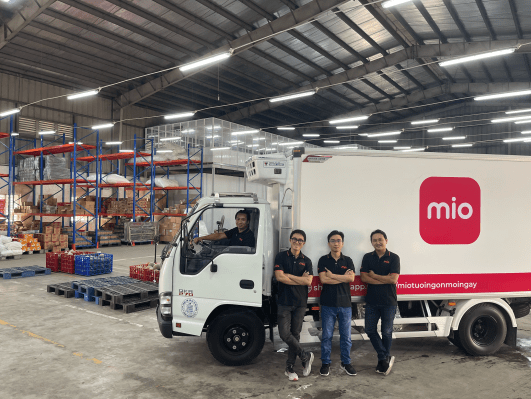Mio, the Vietnamese social commerce platform, has raised an $8 million Series A, less than a year after announcing its seed round. The funding was led by Jungle Ventures, with participation from Patamar Capital and Oliver Jung. Existing investors investors GGV, Venturra, Hustle Fund, iSEED SEA and Gokul Rajaram also returned for the round.
TechCrunch first covered Mio at the time of its $1 million seed funding in May 2021. Founded in 2020, Mio is a group buying platform that focuses on selling fresh produce and groceries in Tier 2 and 3 cities in Vietnam. The company is able to offer next day delivery because it built a logistics infrastructure that enables it to send produce directly from farms to customers.
The Series A brings Mio’s total raised to $9.1 million, and will be used to expand its logistics and fulfillment system, enter new areas in Vietnam and add new product categories like fast-moving consumer goods (FMCG) and household appliances.
Mio co-founder and chief executive officer Trung Huynh said that since TechCrunch first covered Mio seven months ago, it has achieved 10x gross merchandise value growth, a 10x increase in agents, or resellers, and grew its team from 60 people to 240. It now fulfills more than 10,000 pieces of fresh produce per day, operating in Ho Chi Minh, Thu Duc, Binh Duong, Dong Nai and Long An, with plans to expand into northern Vietnam.
The numbers “strengthened our conviction in this model and its potential,” he said. “We need fresh capital to accelerate hiring, product development and supply chain to keep up with the pace of growth as we deepen our presence in existing geographies and expand to new provinces.”
Mio is able to offer next day deliveries because its vertically integrated mayor layers of the value chain, including procurement, warehousing, order sorting and bulk delivery. The startup owns the majority of its logistics infrastructure and uses its own fleet of couriers. Its ability to delivery fresh produce directly from farms to customers in less than 16 hours contributed to higher customer retention and growth, Huynh said, and it will continue to shorten delivery times. .
Mio resellers are called Mio Partners. Huynh said one of the driving factors behind Mio is targeting the right people for the program, or “housewives and stay-home-moms in lower income regions who love sharing value-for-money products to their social circle of friends.”
They aggregate orders, usually from friends and family, and orders are delivered to them in batches for distribution. The startup claims Mio Partners can make up to $400 a month, including a 10% commission on each order and additional commissions based on the monthly performance of other resellers they referred to the program.
“There is a strong possibility” that Mio will expand beyond Vietnam, Huynh said, “but will only be considered at a more appropriate time after we successfully built our playbook for Vietnam.”
